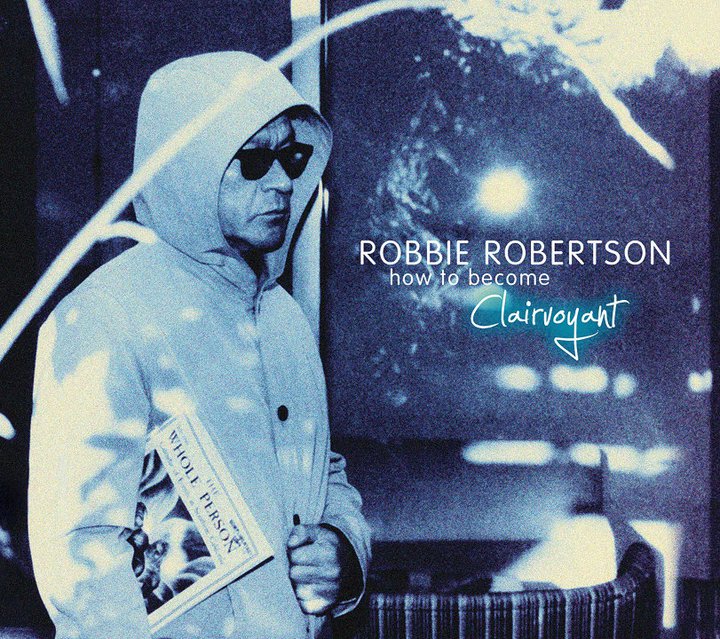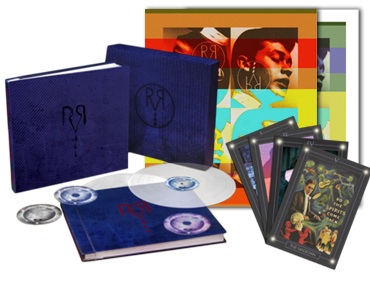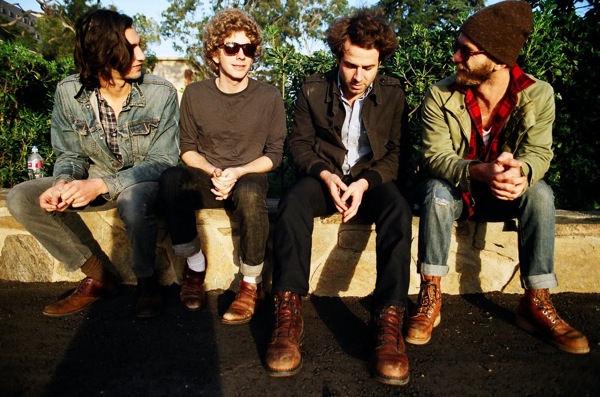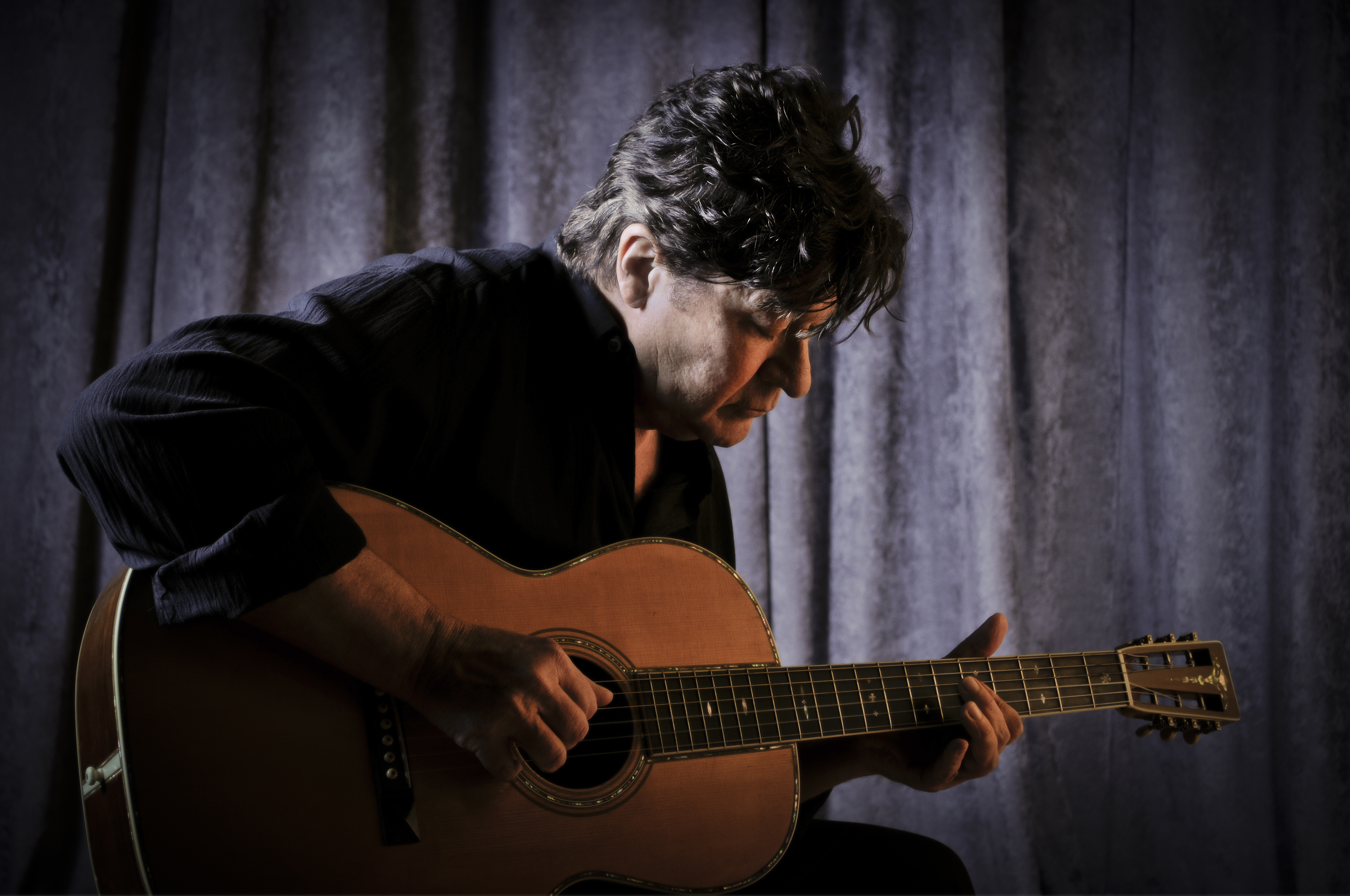Videos by American Songwriter
It’s not every rock and roll star who can say their new album is “still at the printer’s.” But then, Robbie Robertson is not your typical rock and roll star.
From the moment he made his appearance on the world stage, first prodding Bob Dylan with his stinging, economical guitar licks, then as leader of The Band, Robertson has been a breed apart. Quiet, wry, favoring fine, dark suits, fedoras, facial hair and steel-rimmed glasses, he looked like a rabbinical student, who sometimes spent his time on the honky tonk side of town. His songwriting, then and now, described wild, troubled, unhinged, unlucky American characters, John Ford-like guys, who are trying to hold onto old ways as our country changed, and discarded or ignored them.
With his new solo album, How To Become Clairvoyant, he has hit a new peak. Which is saying something considering his songs for The Band, not to mention solo gems like Storyville and Contact From The Underworld of Redboy. The songs, addressing Robertson’s wonderfully-misspent youth are acute lyrically, and he’s also found the best showcase to date for his laconic wolfman’s voice. Acclaimed in every quarter, Clairvoyant is about to appear in a new, staggeringly artistic new persona. The limited edition collector’s set features 2 CDs, 3 vinyl LPs, artwork by legendary painter Richard Prince, tarot cards designed by illusionist Ricky Jay and more.
American Songwriter recently talked with Robertson about the new release. And despite his well-known cool, he spoke enthusiastically about the album’s genesis, working with Eric Clapton and how Clairvoyant grew from solo CD smash into soon-to-be collector’s item.
Possibly more shocking? This former Toronto street kid, who made gesturing with a cigarette an art equal to his Fender guitar slashing, has quit smoking. A sign that may mean the apocalypse actually is nearly here.
Was the Deluxe Edition of How To Become Clairvoyant something that you had planned from the beginning, when you were making the album?
Originally, there was never even a plan to make a new album. In the beginning, there were no particular thoughts. Eric Clapton and I just started hanging out at my studio in Los Angeles, telling stories. We did pick up guitars and set up some microphones, just in case something usable came out of the talking and jamming. In terms of the freedom of it, the idea that nobody would ever hear it? It reminded me of the way we (The Band and Bob Dylan) felt when we did “The Basement Tapes.” Just free. And it was so enjoyable. At some point, though, when we started to get some good stuff down, I said to Eric, ‘There’s something so innocent and pure about what we’re doing here. It would be shame not to really do something with it.’
How did it move on from there?
This series of almost cosmic events that made me know I was on the right track. Not long after that, I go to New York, on business and I visit this painter friend of mine. I play him just a little of the music, such as it was, that Eric and I had gotten down on tape. He tells me he really likes it. And he wonders if he can’t have the stuff to listen to, that he might paint to, that he found it really inspiring. So we send some things back-and-forth. He tells me he’d like to contribute 5 pieces for the (eventual) album. I should tell you now, that guy is Richard Prince. He usually gets somewhere between 7 and 8 million dollars a painting. So, now, we’ve got Richard’s lithographs. I think, ‘You know I’m really onto something if this music is turning people on like that.’
And it clearly snowballed, right?
Sure. The deluxe set will have 10 bonus tracks. And (photographer and video director) Anton Corbijn gets in on this. So, he takes a bunch of pictures of me in a sort of film noir-style. Then there’s Ricky Jay, who’s not only a great illusionist and actor, but has a tremendous interest in Tarot Cards. So, he’s designed some Tarot Cards, based on some of the really old, classic ones in his collection.
Tell me a little bit about the vinyl in this edition. Vinyl is really important for geeky audiophiles.
Yes, it’s clear vinyl. With black vinyl you can cheat a bit, but with clear you’ll hear every inch of sound. And on the DVD, you’ll be able to do your own mix of the album. I’ve been involved in a number of box sets, including that set of The Band from a few years back (The Band: A Musical History), but the sort of care we put into this thing and all the beautiful artwork…I don’t think there’s ever been a deluxe edition of a record, quite like this.
Let’s talk about the music, a bit. I remember reading that when you did Storyville, you said you wrote a treatment for the album, so you knew where to take the story each day. Did you do the same thing when you started getting the Clairvoyant songs together. It certainly seems to tell a good story about some kid’s journey from innocence to experience.
Actually, just the opposite. It was such an intuitive, unconscious process. I had no idea that a lot of the songs would be about my youth and the 60s. It was a total surprise.
Even when you sequenced it?
It just seemed to flow hypnotically. I know that some people do that trick of sequencing tracks in the order that they were recorded. That can sometimes help you tell a story if you’re stuck. But that wasn’t the case here.
Did the state of the record biz, or the doldrums of the economy, give you pause about making another record? I mean, it’s pretty pricey, the Deluxe Edition.
I’m not an expert about those kinds of things. I just knew that once the songs started coming, I was elated. I had all this great material. I couldn’t afford to not to put it out. And it’s more than that. Now that the record is out and this version is coming, I feel, I don’t know, a lovely sense of release.
You’re singing better than you ever have before, Robbie. A guy isn’t supposed to be able to do that in his sixties. Your pitch is great, your little flourishes are affecting. I don’t imagine you quit smoking or anything crazy like that.
Actually, I did. And I wish I had before. I feel better than I have for quite a while.
Did your brand have to declare bankruptcy?
(Laughing) God, I hope not.
The blues has been such a constant in your career, since you first started playing guitar. Is the bluesman in the song, “Straight Down The Line” supposed to be anyone in particular. He does use Mississippi Fred McDowell’s dictum, “I do not play no rock and roll.”
If anybody, it’s probably Sonny Boy Williamson, who The Band played with in the early 60s. There’s the famous story about him going to England and being backed by The Yardbirds and they just played too fast for him. And he said, “I do not play no rock and roll.” Mahalia Jackson use to say it too. Of course, Sonny Boy had a few other words about The Yardbirds.
“Those guys in England, they want to play the blues so badly. And that’s just the way they play them!”
(Chuckles) That’s the one.
Finally, reaching way back, when you wrote “The Weight” and referenced “Nazareth” someone at The Martin Guitar Company told me you meant Nazareth, Pennsylvania, where their guitars are from. Not the birthplace of that famous baby.
I remember sitting around and trying to write that song. I wanted to take people on a journey, someplace they hadn’t been before. I stopped and looked into the sound hole of my guitar, and it being a Martin, the first thing I saw was the word Nazareth. It was one of those lucky accidents that just seemed absolutely perfect. The new album is like that, too. Sometimes, the most mystical, accidental stuff, is exactly what you need. And it helps to get the whole thing rolling.















Leave a Reply
Only members can comment. Become a member. Already a member? Log in.